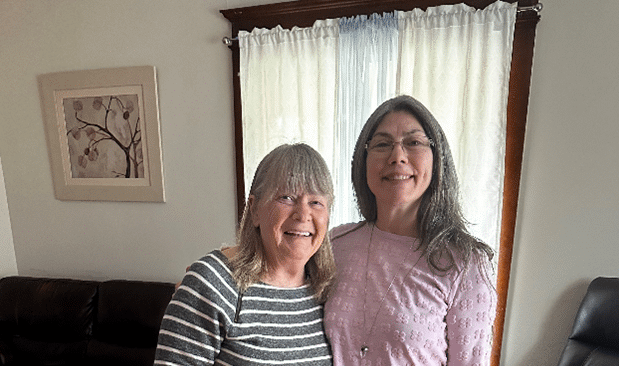
Barbara Rita’s smile can light up a room, and her positive attitude is infectious.
“I really have come a long way since moving here. Everyone here has become my family.”
Barbara Rita Haag is a Syracuse native and a resident in Loretto’s Community Residence Program, which provides supportive residential living environments for adults 45+ with psychiatric disabilities. The program is comprised of three private group homes, which provide a safe, homelike setting for adults who need help to work on building skills to increase their independence in order to live in the least restrictive environment possible. Currently, 26 residents live in these homes, which are managed by a Loretto care team that provides 24/7 support and oversight.
Barbara Rita had previously lived on her own but had some mental health concerns that required professional oversight and care. She says, “I had lived a full life, working almost 50 years in retail and food service, and I came to a point where living alone was not an option anymore. My brother helped me move here, and it has been so good for me.”
One of the reasons she likes living in the Community Residence is that she has formed a new family with Community residents and staff, and she can continue seeing her family regularly. “Since coming here, I have had the best of both worlds—I have made a new family here by getting to know the staff and the people I live with (they call me a ‘chatterbox’ because I love to talk so much), and my family visits me here all the time. It’s nice to have so many good people in my life.”
Michele Rita Gottschalk, the Community Residence Program Executive Director, says emotional support is so important. “Our residents know they are supported here. Everyone is at different stages of their mental health journey, and all are treated with kindness, dignity, and respect. They share the common goal of living independently again. Our job is to teach them the skills they need to accomplish that goal.”
The average stay of a resident in the program is two years, but some, like Barbara Rita, stay longer based on where they are in their mental health journey.
Michele Rita says, “Each resident signs a contract that outlines their goals and provides a timeline and strategies to help them be successful. This contract also includes their responsibilities as residents, such as chores and daily obligations, to create a positive living environment for all. For example, residents take turns cleaning rooms and making dinner—just like families do at home. We really are a big family, supporting, respecting, and helping one another.”
The Community Residence Program is celebrating its 40th anniversary of helping individuals with mental illness this year. Over the course of 40 years, this program has served as a stepping stone for many who have needed help as they transitioned from in-patient psychiatric treatment facilities or co-dependent accommodations to living independently once more. They learn the skills they need to take care of themselves and advocate for their needs, and the staff teaches them how to secure community resources so that when they leave, they are set up for success.
Barbara Rita is thankful for her time as a As a resident at Community Residences and is hopeful for her future. “I’m looking forward to living on my own again, but I will keep in touch with everyone from here. Like I said, we’re family.”
